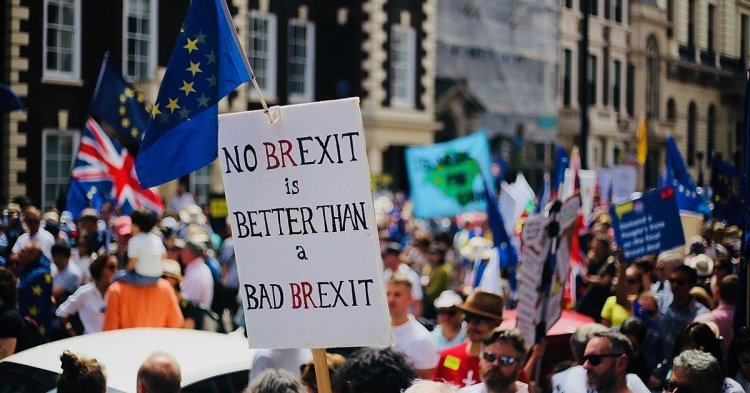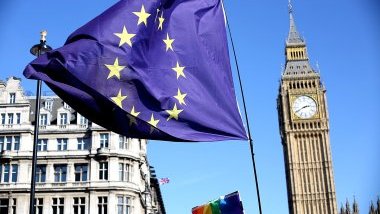A vote on the deal won’t lead to a “neverendum”
Firstly, there is the question of what referendum we are talking about. The phrase “second referendum”, persistently used by pro-Brexit campaigners, is inaccurate. While “People’s Vote” is the campaign catchphrase, “referendum on the deal” would be the most appropriate phrasing. Whether one thinks a vote on the deal is different enough from June 23 is a matter of personal conscience. However, given that some of the fundamentals - for one thing, whether Brexit means leaving the Customs Union, a crucial question for Northern Ireland - were clear to no-one in June 2016, it seems ill-intentioned to claim that a vote on the final outcome of the negotiations is unwarranted.
This also liberates us from the “neverendum” cycle. The idea of voting on the deal once there’s black on white about what Brexit means is legitimate. If in such a vote the British people decide to stay in the EU, and anti-EU politicians are unhappy, it is up to them to find solid legitimation for a new referendum to leave the EU. That’s no easy task: it’s hard to imagine even the Conservatives including a “third referendum” in their next election manifesto. A legitimate reason to call a new referendum might be an EU treaty change, or on the other hand a vote on rejoining the EU. However, it’s unlikely that either of these would immediately follow the vote on the deal, no matter which way it goes. Letting the people vote on the deal won’t create an endless cycle of EU referenda in the UK.
Another uninformed vote?
The vote on the deal won’t be the same as the June 23 referendum. However, there remain legitimate doubts about whether the electorate can make a well-informed decision on a multidimensional issue that involves a range of topics from trade to security and beyond. It scarcely comes as a surprise that the Brexit deal, if there is one, won’t be an easily digestible document. Whack that in front of a voter, and odds are that you will see a confused face.
In the ideal case, it would indeed be the Parliament that decides on the matter. However, since the June 23 vote was taken by the people, not by the Parliament, it would seem illegitimate to finish the business in the Parliament. It started with a popular vote; let it finish with a popular vote.
A country’s policy on EU membership is a complex, multifaceted issue. What’s more, you can’t talk about the EU without thinking of foreigners, which easily muddles debates on the topic. However, if any electorate can ever make an informed decision on the matter, maybe the most opportune situation is one in which the EU has dominated the public debate for more than two years. [1] If there ever should be a referendum on an EU topic in the United Kingdom, there should be a referendum on the Brexit deal.
The Parliament can’t do it on its own
As I wrote earlier, the UK Parliament is between a rock and a hard place. The majority of MPs don’t want a no-deal Brexit; the majority may well reject Theresa May’s deal; and at the same time the majority are (rightly) too scared to call the whole thing off. Lukas Martini correctly pointed out that a general election would, timetable-wise, be a more than risky option. In the absence of other alternatives, the majority may well want to put it to the people.
New scenarios for how the people can get their say on the deal continue to spring up, and the most recent one, from just a few days ago, comes from inside the Parliament. A cross-party amendment to the Brexit deal bill is under preparation, demanding that the acceptance of any Brexit deal be conditional on a public vote. Lobbying MPs is a good strategy, as long as we lobby them to let the people decide. Both David Cameron and Theresa May made mistakes, and so the ideal options are no longer available. Given where we are today, however, having a ‘People’s Vote’ on the deal is the best thing the UK could do.






1. On 31 October 2018 at 14:39, by Ian Beckett Replying to: There’s nothing undemocratic about letting the people vote on the Brexit deal
Replying to: There’s nothing undemocratic about letting the people vote on the Brexit deal
“However, given that some of the fundamentals - for one thing, whether Brexit means leaving the Customs Union, a crucial question for Northern Ireland - were clear to no-one in June 2016”
You might enjoy this video clip showing numerous leaders from both sides of the campaign saying categorically prior to the referendum vote that leaving the EU means leaving the customs union and the single market. So it seems people did know what they were voting for.
by Mark Braithwaite
In addition of course, the Government leaflet sent to every house makes it clear continued membership of the single market on leaving the EU would be uncertain.
As a matter of interest, please could you write an article setting out in your view exactly what the position of the UK would be after a second referendum regarding EU membership. Dealing with such issues as the rebate, the numerous previously accumulated opt outs, the negotiated additional conditions offered to David Cameron in February 2016 and the UK existing legal requirement for additional referenda on any further integration with the EU in the European Union Act 2011. It would make for interesting reading I am sure.
Follow the comments: |
|
